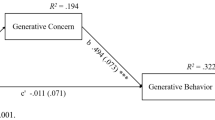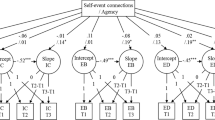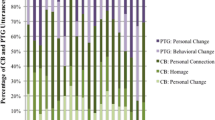Abstract
According to Erikson’s developmental model, achieving intimacy in young adulthood should predict higher levels of generativity later in life. This mixed quantitative and qualitative, longitudinal study examined the relationship between generative concern and intimacy in young adulthood (from ages 26–32). Participants (N = 147; 69 % female; 74.1 % college educated) told a narrative about a “relationship defining moment” with a same-sex friend, and completed self-report questionnaires of optimism and generative concern at ages 26 and 32. Optimism and generative concern had strong stability over time, while friendship intimacy did not exhibit test–retest stability. Most participants (88.6 %) disclosed a different story at each time point, which contributed to the lack of rank-order stability for friendship intimacy in the present study. Friendship intimacy was positively correlated with age 26 and age 32 generative concern. Both sex and optimism predicted longitudinal increases in generative concern over 5 years, with women and people higher in optimism seeing larger increases. Friendship intimacy coded from narratives at 26 predicted (p = .052) increases in generative concern at 32. The present study extended prior research by examining the relationship between intimacy and generative concern as people develop from emerging to young adulthood. Following Erikson, developing close relationships with others, exhibiting an optimistic outlook on life, and being female appear to facilitate greater generative concern in young adults.
Similar content being viewed by others
References
Ackerman, S., Zuroff, D. C., & Moskowitz, D. S. (2000). Generativity in midlife and young adults: Links to agency, communion, and subjective well-being. The International Journal of Aging & Human Development, 50, 17–41. doi:10.2190/9F51-LR6T-JHRJ-2QW6.
Arnett, J. J. (2000). Emerging adulthood: A theory of development from the late teens through the twenties. American Psychologist, 55, 469–480. doi:10.1037/0003-066X.55.5.469.
Avey, J. B., Wernsing, T. S., & Mhatre, K. H. (2011). A longitudinal analysis of positive psychological constructs and emotions on stress, anxiety, and well-being. Journal of Leadership & Organizational Studies, 18, 216–228. doi:10.1177/1548051810397368.
Baumeister, R. F., & Leary, M. R. (1995). The need to belong: Desire for interpersonal attachments as a fundamental human motivation. Psychological Bulletin, 117, 497–529. doi:10.1037/0033-2909.117.3.497.
Busch, H., & Hofer, J. (2011). Identity, prosocial behavior, and generative concern in German and Cameroonian Nso adolescents. Journal of Adolescence, 34, 629–638. doi:10.1016/j.adolescence.2010.09.009.
Busch, H., & Hofer, J. (2012). Self-regulation and milestones of adult development: Intimacy and generativity. Developmental Psychology, 48, 282–293. doi:10.1037/a0025521.
Christiansen, S. L., & Palkovitz, R. (1998). Exploring Erikson’s psychosocial theory of development: Generativity and its relationship to paternal identity, intimacy, and involvement in childcare. Journal of Men’s Studies, 7, 133–156. doi:10.3149/jms.0701.133.
Clark, M. S., & Reis, H. T. (1988). Interpersonal processes in close relationships. Annual Review of Psychology, 39, 609–672. doi:10.1146/annurev.ps.39.020188.003141.
Conway, M. A., & Holmes, A. (2004). Psychosocial stages and the accessibility of autobiographical memories across the life cycle. Journal of Personality, 72, 461–480. doi:10.1111/j.0022-3506.2004.00269.x.
Creswell, J. W., & Clark, V. L. P. (2007). Designing and conducting mixed methods research. Thousand Oaks, CA: Sage Publications.
Dumas, T. M., Lawford, H., Tieu, T., & Pratt, M. W. (2009). Positive parenting in adolescence and its relation to low point narration and identity status in emerging adulthood: A longitudinal analysis. Developmental Psychology, 45, 1531–1544. doi:10.1037/a0017360.
Erikson, E. H. (1963). Childhood and society (2nd ed.). New York: Norton.
Graham, J. W. (2009). Missing data analysis: Making it work in the real world. Annual Review of Psychology, 60, 549–576. doi:10.1146/annurev.psych.58.110405.085530.
Habermas, T., & Bluck, S. (2000). Getting a life: The emergence of the life story in adolescence. Psychological Bulletin, 126, 748–769. doi:10.1037/0033-2909.126.5.748.
Jackson, L. M., Pratt, M. W., Hunsberger, B., & Pancer, S. M. (2005). Optimism as a mediator of the relation between perceived parental authoritativeness and adjustment among adolescents: Finding the sunny side of the street. Social Development, 14, 273–304. doi:10.1111/j.1467-9507.2005.00302.x.
Johnson, H. D., Brady, E., Mcnair, R., Congdon, D., Niznik, J., & Anderson, S. (2007). Identity as a moderator of gender differences in the emotional closeness of emerging adults same- and cross-sex friendships. Adolescence, 42, 1–23.
Jones, R. M., Vaterlaus, J. M., Jackson, M. A., & Morrill, T. B. (2014). Friendship characteristics, psychosocial development, and adolescent identity formation. Personal Relationships, 21, 51–67. doi:10.1111/pere.12017.
Karacan, E. (2014). Timing of parenthood and generativity development: An examination of age and gender effects in Turkish sample. Journal of Adult Development. Advance online publication. doi:10.1007/s10804-014-9192-z.
Laurenceau, J., Feldman-Barrett, L. F., & Pietromonaco, P. R. (1998). Intimacy as an interpersonal process: The importance of self-disclosure, partner disclosure, and perceived partner responsiveness in interpersonal exchanges. Journal of Personality and Social Psychology, 74, 1238–1251. doi:10.1037/0022-3514.74.5.1238.
Lawford, H. L., Doyle, A., & Markiewicz, D. (2013). The association between early generative concern and caregiving with friends from early to middle adolescence. Journal of Youth and Adolescence, 42, 1847–1857. doi:10.1007/s10964-012-9888-y.
Lawford, H., Pratt, M. W., Hunsberger, B., & Pancer, M. S. (2005). Adolescent generativity: A longitudinal study of two possible contexts for learning concern for future generations. Journal of Research on Adolescence, 15, 261–273. doi:10.1111/j.1532-7795.2005.00096.x.
Mackinnon, S. P., Nosko, A., Pratt, M. W., & Norris, J. E. (2011). Intimacy in young adults’ narratives of romance and friendship predicts Eriksonian generativity: A mixed method analysis. Journal of Personality, 79, 587–617. doi:10.1111/j.1467-6494.2011.00692.x.
Mackinnon, S. P., Sherry, S. B., Pratt, M. W., & Smith, M. M. (2014). Perfectionism, friendship intimacy and negative affect: A longitudinal study using mixed methods. Canadian Journal of Behavioral Science, 46, 49–59. doi:10.1037/a0033764.
McAdams, D. P. (2001). The psychology of life stories. Review of General Psychology, 5, 100–122. doi:10.1037/1089-2680.5.2.100.
McAdams, D. P., Bauer, J. J., Sakaeda, A. R., Anyidoho, N., Machado, M., Magrino-Failla, K., et al. (2006). Continuity and change in the life story: A longitudinal study of autobiographical memories in emerging adulthood. Journal of Personality, 74, 1371–1400. doi:10.1111/j.1467-6494.2006.00412.x.
McAdams, D. P., & de St. Aubin, E. (1992). A theory of generativity and its assessment through self-report, behavioral acts, and narrative themes in autobiography. Journal of Personality and Social Psychology, 62, 1003–1015. doi:10.1037/0022-3514.62.6.1003.
McAdams, D. P., de St. Aubin, E., & Logan, R. L. (1993). Generativity among young, midlife, and older adults. Psychology and Aging, 8, 221–230. doi:10.1037/0882-7974.8.2.221.
McAdams, D. P., & Logan, R. L. (2004). What is generativity? In E. de St. Aubin, D. P. McAdams, & T. Kim (Eds.), The generative society: Caring for future generations (pp. 15–31). Washington, DC: American Psychological Association. doi:10.1037/10622-002.
McAdams, D. P., & Pals, J. L. (2006). A new big five: Fundamental principles for an integrative science of personality. American Psychologist, 61, 204–217. doi:10.1037/0003-066X.61.3.204.
McLean, K. C., & Pratt, M. W. (2006). Life’s little (and big) lessons: Identity statuses and meaning-making in the turning point narratives of emerging adults. Developmental Psychology, 42, 714–722. doi:10.1037/0012-1649.42.4.714.
Milan, A. (2008). Fertility: Overview, 2008. Retrieved from 12 Dec 2014. http://www.statcan.gc.ca/pub/91-209-x/2011001/article/11513-eng.htm.
Pratt, M. W., & Lawford, H. L. (2014). Early generativity and types of civic engagement in adolescence and emerging adulthood. In L. M. Padilla-Walker & G. Carlo (Eds.), Prosocial development: A multidimensional approach (pp. 410–436). New York: Oxford University Press.
Pratt, M. W., Norris, J. E., Alisat, S., & Bisson, E. (2013). Earth mothers (and fathers): Examining generativity and environmental concerns in adolescents and their parents. Journal of Moral Education, 42, 12–27. doi:10.1080/03057240.2012.714751.
Rothrauff, T., & Cooney, T. M. (2008). The role of generativity in psychological well-being: Does it differ for childless adults and parents? Journal of Adult Development, 15, 148–159. doi:10.1007/s10804-008-9046-7.
Scheier, M. F., & Carver, C. S. (1985). Optimism, coping, and health: Assessment and implications of generalized outcome expectancies. Health Psychology, 4, 219–247. doi:10.1037/0278-6133.4.3.219.
Smith, B., & Sparkes, A. C. (2008). Contrasting perspectives on narrating selves and identities: An invitation to dialogue. Qualitative Research, 8, 5–35. doi:10.1177/1468794107085221.
Sullivan, H. S. (1953). The interpersonal theory of psychiatry. New York: W W Norton & Co.
Westermeyer, J. F. (2004). Predictors and characteristics of Erikson’s life cycle model among men: A 32-year longitudinal study. The International Journal of Aging & Human Development, 58, 29–48. doi:10.2190/3VRW-6YP5-PX9T-H0UH.
Acknowledgments
This study was funded by Social Sciences and Humanities Research Council of Canada Grant # 410-2011-2372 to the last author and colleagues. The authors thank Susan Alisat, Eric Theriault, Florence Mak, Melissa Sleightholm, Elise Bisson, and Glenn Gorman for their help with interviewing, coding and analysis.
Author information
Authors and Affiliations
Corresponding author
Rights and permissions
About this article
Cite this article
Mackinnon, S.P., De Pasquale, D. & Pratt, M.W. Predicting Generative Concern in Young Adulthood from Narrative Intimacy: A 5-Year Follow-Up. J Adult Dev 23, 27–35 (2016). https://doi.org/10.1007/s10804-015-9218-1
Published:
Issue Date:
DOI: https://doi.org/10.1007/s10804-015-9218-1




